Adventurous investors keen to shield their hard earned cash from the taxman have been snapping up venture capital trusts (VCTs).
British investors deposited £19 million in the first six months of this year alone into the tax efficient investment products, which hold a portfolio of start-up companies and early-stage businesses.
This surge helped push assets under management to an all-time high of £2.9 billion. Investment into VCTs was buoyed by the Government's extension to the tax-efficiency terms of the products in this tax year.
As of April VCT managers can invest in companies that have assets worth £15 million or less, where previously the investment threshold was £7 million or less.
In order to spread the risk, a VCT will provide capital to several companies; softening the blow to the investors should one holding go under.
In order to compensate the investor for the risk of investing in unquoted assets, VCTs offer 30% income tax relief for the year they invest, and the capital growth is also tax free; any dividends payable are also tax-free.
You have to be invested for five years to qualify for the tax breaks, but as VCTs are listed vehicles you can sell your shares before maturity should you wish. Minimum investment is typically £5,000 with a maximum allowance of £200,000.
Adrian Lowcock, Senior Investment Manager at Hargreaves Lansdown said that it was no coincidence funds under management were concentrated to a small number of managers.
"Those with established, successful track records continue to attract funds year after year," he said.
"For investors the attractions of participating in top-ups to existing VCTs, rather than backing brand new VCTs, are clear. Top-ups provide access to mature portfolios with the potential for early tax-free dividends. Brand new VCTs can take a number of years to become fully invested and mature."
Ian Sayers, Director General, Association of Investment Companies (AIC) said VCTs continue to play a vital role in supporting SMEs facing a finance gap.
He continued: "We are seeing solid dividends amongst the established VCTs which, together with more consistent performance, reflect the sector’s increased maturity."





























